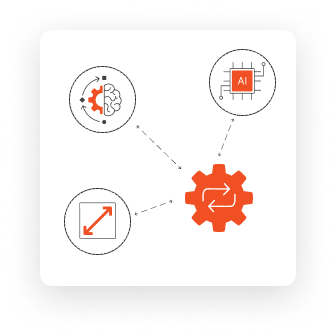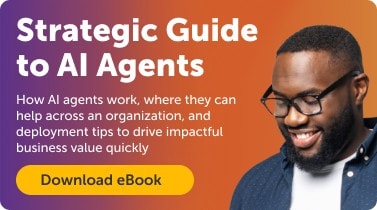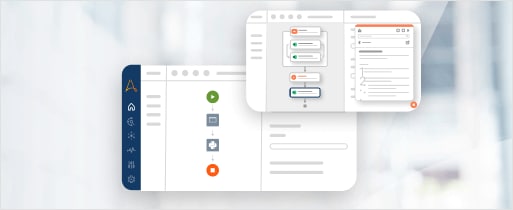What is enterprise AI? Benefits, best practices, and examples.
The term "enterprise AI" refers to the integration of artificial intelligence (AI) technologies within large organizations. Deploying enterprise AI aims to increase operational efficiency, drive innovation, and improve decision-making processes as businesses navigate increasing competition and evolving customer expectations. AI tools offer large organizations capabilities that enable scaling operations, automating routine tasks, and harnessing data to make informed, strategic decisions.

Above all, global organizations are recognizing that AI is not a tech trend; it’s the lynchpin of growth strategies. In this context, the shift toward AI-driven operations is non-negotiable for organizations of all sizes in order to adapt to market changes, sustain performance, and stay relevant.
This article will define enterprise AI and explore how it works, using real-world examples of its benefits and the challenges organizations may face during implementation.
What is enterprise AI?
Enterprise AI refers to the strategic implementation of AI technologies to address complex business challenges at scale within large-size organizations.
Enterprise AI is not simply the application of AI technologies; it’s about strategically leveraging AI capabilities to transform business operations, drive growth, and create a sustainable competitive advantage. While general AI applications may focus on specific tasks or functions—such as chatbots for customer service or recommendation engines for e-commerce—enterprise AI is distinguished by its emphasis on scalability, security, and the ability to process large volumes of data from diverse sources.
Platforms and solutions for enterprise AI are designed to integrate into existing systems and workflows while maintaining robust security and compliance at scale. Their aim is to enable organizations to deploy AI capabilities across teams and use cases to automate and optimize business processes, elevate customer experiences, and achieve measurable business outcomes.
Why is enterprise AI important for organizations?
Some of the most clear-cut advantages of enterprise AI stem from its ability to automate work from simple, repetitive tasks to complex workflows. Deploying AI-driven automation can significantly reduce errors, accelerate operations, and allow employees to focus on higher-value activities.
Enhancing decision-making processes is another major area of value. By analyzing large volumes of data to identify patterns and trends that might be imperceptible to humans, AI algorithms can provide actionable insights that drive faster and more accurate business decisions. Faster, more effective decision-making is particularly valuable in areas like financial forecasting, inventory management, and market analysis, where timely and informed decisions are at the core of business growth.
Because the complexity and volume of data grow in concert with organization size, enterprise AI systems are designed to operate at a large scale. They are built to handle high-volume data loads and more complex operations and to expand seamlessly as capacity needs grow. This scalability supports maintaining efficiency and performance levels without compromising process quality or speed, even as operational demands escalate.
Enhancing customer interactions is another high-value area where enterprise AI is making a significant impact. AI-powered and agentic systems, including but not limited to chatbots and virtual assistants, can provide personalized experiences in real time by incorporating customer data and preferences within interactions and workflows. These intelligent systems enable 24/7 customer support, can handle inquiries independently, and can tailor recommendations—all important factors in delighting customers and fostering brand loyalty.
How does enterprise AI work?
Enterprise AI, like AI systems in general, works by combining data with intelligent algorithms to learn from patterns and features present in the data to take appropriate action, whether delivering insights, responding directly to customer requests, or surfacing relevant data within a workflow.
The effectiveness of AI therefore hinges on the quality and volume of data, both structured and unstructured. This means that it’s essential to integrate AI technologies with existing enterprise systems, such as customer relationship management (CRM), enterprise resource planning (ERP), and supply chain management platforms, to enable seamless data flow and ensure that AI applications can access real-time information. Without integration, or when AI is constrained by incomplete, fragmented, or siloed data, enterprises risk falling short of realizing AI's full potential.
Machine learning (ML) models are the engines that power enterprise AI systems. These models are trained on extensive datasets specific to the organization’s operations, enabling them to learn and adapt continuously. As the models process more data, they become increasingly accurate in their predictions and recommendations, enhancing their ability to support business decision-making and operational processes. Large language models (LLMs) that form the backbone of generative AI tools are a recent powerful example of machine learning models.
Enterprise AI is often deployed alongside automation. This approach provides a robust framework to integrate AI capabilities within enterprise workflows and realize immediate value while ensuring safety, security, and compliance requirements are met. In turn, AI-driven automation improves automation performance—for example, automated data entry that uses AI-driven data validation to ensure information is accurate—and enables automating complex processes that require decision-making and adaptability.
For example, in supply chain management, AI-driven automation can predict demand fluctuations, optimize inventory levels, and manage logistics more efficiently than traditional automation methods.
Real-world examples of enterprise AI in action.
Enterprise AI is transforming industries and business functions by enabling the automation of complex workflows and uncovering opportunities for new ways to operate and optimize.
Industry-specific applications of AI demonstrate its versatility and ability to deliver value across diverse business contexts. For example, in financial services, enterprise AI applications include fraud detection and risk assessment, while in healthcare, AI can support diagnostics, treatment recommendations, and critical systems monitoring.
In financial services, HSBC utilized AI-driven algorithms to analyze transaction patterns in real time, identifying anomalies indicative of fraudulent activity. The proactive approach increased the detection of financial crime risk by 2-4 times and reduced false positive alerts by more than 60%.
In the healthcare industry, AI offers much-needed support for both administrative and critical care processes. In the UK, several NHS organizations have become innovation leaders though implementing AI-powered automation. One of them, Kent Community Health NHS Foundation Trust (KCHFT), has saved over £700K, freeing 45,000 hours of capacity through automated administrative workflows in human resources. Another, Northampton General Hospital, created a first-of-its-kind automation to monitor oxygen supply, achieving 100% data input accuracy and eliminating clinical risk.
In both the energy and mining industries, streamlining operations is top of mind. At Vale, anticipated sales growth made automating core processes a necessity. AI-powered process discovery analyzed actions across a workforce of 234,000 people in 18 countries and quickly identified five workflows to automate. The resulting efficiencies saved Vale over 121,000 hours and $5 million annually, and enabled the organization to handle the increased workload.
Latin America's largest electric company, Electrobras, meticulously reviews 65,000 technical documents each year. AI-powered automation transformed 10,000 hours of complex, manual document processing within four weeks, attaining 92% automation and saving $227,000.
In manufacturing, companies like Siemens integrate AI into production lines for predictive maintenance and process optimization, achieving substantial efficiency gains and cost reductions.
Enterprise AI applications within business functions similarly run the gamut of processes, demonstrating the endless opportunities to apply AI.
In customer service, AI-driven chatbots and automations that route inquiries to the right agent are accelerating service and improving customer experience and satisfaction. Automation Anywhere’s customer support team reduced overhead by 30% and increased CSAT by 10% through implementing AI-driven workflows.
For ticket routing, AI agents streamline inquiry review and routing workflows by analyzing the context and intent of incoming customer service inquiries. Simple, low-urgency inquiries can be resolved instantly with a knowledge base response, while complex issues are directed to human agents for further handling.
HR processes and associated data require automation and analysis that can handle the human nuances inherent to the domain—an area of high potential for applying AI solutions. AI-driven analytics can assess employee engagement via sentiment analysis of survey data, allowing HR to more quickly address feedback with targeted initiatives.
Another application of AI in HR is the hiring process, where AI-powered automation can reduce the time spent on manual resume reviews and improve the quality of hires. At Softbank, AI-driven automation transformed key talent acquisition processes, leading to an 85% reduction in hours spent on recruitment evaluation.
Marketing operations and content creation represent one of the top early adoption areas of generative AI within enterprises. Marketing teams can use AI to analyze customer data and behavior, helping create targeted advertising campaigns that resonate with specific market segments, driving higher conversion rates and ROI. For consumer brands, AI can be implemented for sentiment analysis to monitor social media conversations and customer feedback, enabling real-time adjustments to marketing strategies based on public perception. Beyond campaign optimization, marketing teams are also increasingly using AI agents for localization to streamline multilingual content creation, reduce costs, and ensure consistency across global markets.
Key Benefits of Enterprise AI
While specific use cases illustrate the depth and breadth of applications of AI for large organizations, another important aspect to consider is the overarching benefits that enterprise AI offers.
Focus on higher-value work
By automating routine repetitive tasks, enterprise AI enables employees to refocus on work that requires creativity, strategic thinking, and emotional intelligence. This shift not only supports a better employee experience but also drives innovation and business growth as teams are engaged in more strategic and impactful projects.
Operational cost reduction
AI-driven automation leads to significant cost reductions by optimizing workflows and resource use. Organizations can achieve higher efficiency with fewer resources, lowering operational expenses (OpEx) while maintaining or even improving service quality and output.
Data governance and compliance
Enterprise AI can drive better data governance by making it an operational imperative that data is managed consistently and securely across the organization. And AI systems can enforce data quality standards, monitor compliance with regulatory requirements, and protect sensitive information with advanced AI data privacy and security protection.
Improved decision-making
AI's ability to analyze large data sets offers organizations insights that can significantly improve decision-making. By quickly spotting and surfacing trends and patterns, AI can inform decisions, from forecasting market trends to optimizing supply chains and tailoring customer experiences.
Scalability and flexibility
AI systems are inherently scalable and flexible, making them ideal for supporting enterprises that need to adapt to evolving demand and shifting markets. Enterprise AI solutions are typically designed to integrate seamlessly with existing systems, allowing organizations to grow AI capabilities without overhauling infrastructure.
Improved customer experience
By analyzing customer data and preferences, even in real time, AI can deliver immense value to customer interactions by personalizing experiences and ensuring consistent, reliable service. In addition, AI-powered chatbots and virtual assistants can provide 24/7 support so that customers can access help whenever they need it, helping enterprises meet rising customer expectations and earn loyalty.
Innovation and competitive advantage
Last but certainly not least, enterprise AI is a catalyst for innovation, agility, and responsiveness to market dynamics. Harnessing AI can open doors to new business models and opportunities that weren't possible before.
Challenges of implementing enterprise AI.
At the same time as enterprise AI offers efficiencies and cost-cutting possibilities, the road to implementing AI is not without its challenges. Adopting any new technology comes with its share of potential risks and rewards—and enterprise AI is no exception. Recognizing the challenges of implementing AI at enterprise scale is essential for crafting strategies that ensure successful adoption and maximize ROI.
Data gathering and integration
One of the primary challenges in implementing enterprise AI is gathering and integrating high-quality data from diverse sources that are representative of the domain in question. Disparate data systems, data silos, and inconsistent formats are common roadblocks impacting the accuracy and effectiveness of AI models.
Lack of AI expertise
Another significant obstacle to AI implementation is the shortage of skilled AI professionals who can design, develop, and manage AI systems effectively. This talent gap can delay AI project implementations and limit the potential benefits of AI technologies. Solutions include upskilling existing employees, partnering with AI service providers, as well as capitalizing on no-code AI platforms, like Automation Anywhere’s AI Agent Studio, that require minimal data science expertise to create and deploy AI-driven solutions.
Initial investment
Implementing enterprise AI can involve substantial upfront investments in technologies, infrastructure, and training. However, many AI implementations deliver value right away. In the case of Petrobras, implementing a generative AI automation solution returned $120M in savings in just three weeks. Of course, effective AI implementations will continue to add value over the long term, with a return on investment from operational efficiencies, cost savings, and revenue growth.
Stakeholder buy-in
Securing buy-in from all organizational stakeholders is at the core of successful AI adoption. Resistance to change, lack of clarity on the benefits of AI, and concerns about job displacement can impede AI initiatives. Effective change management strategies, clear value propositions, and showcasing the diversity of AI use cases and successful AI implementations can help align stakeholders and generate excitement.
Best practices for implementing enterprise AI.
Because the adoption of AI is accelerating, there is no shortage of best practices to learn from, gleaned from the successes (and failures) experienced by enterprises of all sizes and industries already on the enterprise AI journey.
Learning from these best practices helps enterprises navigate the complexities of AI implementation to deliver meaningful and sustainable value.
Maintain data quality and governance
Mirroring the challenge of data gathering and integration, maintaining high data quality and robust governance practices is non-negotiable for effective AI deployment. Establishing strong data pipelines, ensuring data readiness, and implementing data governance frameworks all contribute to consistent, secure data management. These practices underpin the reliability of AI models and also support regulatory compliance.
Start small, then scale
Embarking on AI integration with small, focused projects can boost the chances of success. Pilot projects allow organizations to test an AI solution and demonstrate tangible benefits before scaling up or expanding AI initiatives across the enterprise. For example, Merck focused on compliance-related document processing to deploy AI-powered automation. The resulting 150,000 hours saved—and earning an industry compliance award—spurred expanding enterprise AI initiatives throughout operations, including go-to-market processes, product development, and supply chain.
Define clear objectives
AI implementations should be guided by clear business objectives to ensure alignment with organizational goals. Defining specific use cases where AI can add value, whether in customer experience or optimizing operations, helps in selecting the right AI tools and setting measurable targets. This focus ensures that AI projects deliver meaningful outcomes and contribute to overall business growth.
Involve cross-functional teams
Diversity supports the effectiveness of applying AI. Bringing together different departments helps in developing comprehensive AI strategies that address the multi-faceted reality of existing workflows to drive collective success.
Embrace AI as an evolving system
AI is a continually evolving system, requiring ongoing updates and optimization of models, integration of feedback, and adaptation to shifting business environments and needs. Taking an adaptive approach ensures that AI initiatives remain effective and relevant, and consistently deliver value over the long term.
Ensure responsible use
Establish ethical guidelines and governance structures to oversee AI deployment and ensure responsible use. For example, creating an AI ethics committee to review projects and uphold standards of fairness and transparency helps build trust while ensuring compliance with regulatory requirements.
Key features to look for in an enterprise AI platform.
Data handling and scalability
A robust enterprise AI platform must be capable of handling large volumes of enterprise-grade data and scaling with the organization's growth. Efficient data management, scalability across departments, and the ability to process diverse data types are essential features that ensure the platform can support expanding business needs without compromising performance.
Integration with automation tools
Seamless integration with automation tools is vital for maximizing AI’s potential. An enterprise AI platform should effortlessly connect with other business systems and automation tools, powering smooth workflow automation with pre-built connectors, packaged APIs, and cloud execution.
Secure data processing
Enterprise data security concerns aren’t going away anytime soon. Any AI platform must include built-in comprehensive security mechanisms to protect sensitive data during processing and storage. Features such as encryption, access controls, and compliance with industry standards are table stakes to ensuring that data is handled safely and risks of data breaches and unauthorized access are minimized.
Adaptive machine learning models
Effective AI models are adaptive and learn based on evolving data and business needs. This enables ongoing optimization and increasing accuracy and effectiveness over time.
In addition, platforms that harness large language models (LLMs) for generative AI applications should continuously maintain and refresh training data. In many cases, creating an optimal generative AI-powered workflow requires multiple underlying models and/or comparative model selection. Robust enterprise AI platforms will offer model choice and flexibility.
Future of enterprise AI.
AI technology is enjoying a period of rapid advancement, driving a tangible shift for enterprises eager to innovate and keep up with the competition. Advancements in AI are making a significant impact on enterprise automation. In particular, AI agents represent a new horizon of opportunity that is redefining applications of AI across the board.
AI agents combine cognitive AI capabilities with action and automation across enterprise systems and data. What this means in practical terms is that AI agents use generative AI models to make decisions, learn from data, interact in natural language, and take action to achieve predefined goals. As this technology continues to evolve, AI agents represent a means to achieving autonomous automation, referred to as agentic process automation.
Agentic process automation is rooted in Intelligent Automation, which combines AI with automation technologies. Intelligent Automation is gaining widespread adoption as it allows for the automation of more complex and decision-driven tasks, leading to greater operational efficiencies and innovation. With AI agents, Intelligent Automation can transform business functions, from supply chain management to customer service, by enabling systems to learn, adapt, and perform tasks autonomously.
Enterprise AI is also seeing significant advancements in predictive analytics. Innovations in this area will enable businesses to forecast market trends, consumer behaviors, and operational needs with unprecedented accuracy. Enhanced predictive capabilities will support strategic planning, risk management, and proactive decision-making, driving sustainable business growth.
And as enterprise AI continues to evolve, job roles within organizations will also continue to transform. The shift from routine and manual tasks to roles built around strategic, creative, and interpersonal work will require a workforce skilled in managing and collaborating with AI systems and built on a culture of continuous learning and adaptability.
Tying AI to enterprise value.
Connecting AI initiatives to tangible business outcomes ensures that enterprises realize value and achieve strategic objectives. While that is certainly easier said than done, organizations that follow enterprise AI best practices—like high-quality data, strong security and governance, and applying AI based on clear business objectives—are among those realizing a return on AI investments.
Primarily, organizations measure the value of AI initiatives through productivity increases. Given that recent estimates peg enterprise AI with the potential to automate up to 70% of the work taking up employees’ time, evaluating productivity is spot on for assessing how AI is delivering on its potential value.
Lower customer acquisition costs (CAC) are another opportunity to connect AI implementations to enterprise value. Sales and marketing applications of AI are leading the adoption pack. Harnessing AI-driven insights to target potential customers more effectively has a direct impact on CAC. By analyzing customer data and predicting behavior, businesses can tune marketing strategies to attract the right buyers, minimizing expenses and maximizing return on marketing investments.
Increasing customer retention through better customer experiences is an avenue for measuring the value of AI deployments in service operations environments. More personalized interactions and faster support lead to higher customer retention rates. AI-powered tools can anticipate customer needs, resolve issues proactively, and maintain consistent engagement, contributing to customer loyalty and sustained revenue.
Measuring reductions in operational expenses (OpEx) is another path to recognizing enterprise value from AI, in particular through AI-driven automation. Intelligent Automation optimizes workflows, automates routine tasks, and drives efficient resource utilization, all contributing to lower operating costs. In turn, cost-efficiency gains support profitability and financial stability.
Introducing Automation Anywhere's enterprise AI platform.
Enterprise AI is transforming how organizations operate, and AI adoption is accelerating. With this increasing momentum comes increasing pressure on leaders to deploy AI and demonstrate ROI today. In this context, making future-proof choices is difficult—but not impossible.
While the journey to AI integration presents challenges from data to talent shortages, the benefits far outweigh the obstacles, as demonstrated by examples of breakout AI-automation impact, like 1300% ROI. Applying best practices and selecting tools that have a proven track record of both delivering value and innovation ensures a path to effective AI implementation.
Automation Anywhere's AI + Automation Enterprise System embodies the future of enterprise AI, offering secure and adaptive solutions designed for large-scale deployments, including generative AI-powered self-healing automation and low-code custom AI agent creation.
Explore how to apply enterprise AI for your organization with a personalized demo.











